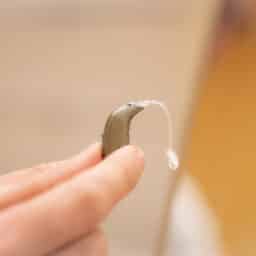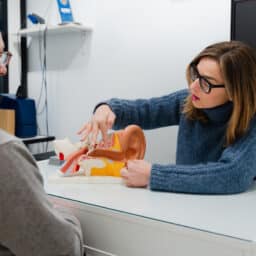Make the Most of Social Gatherings: Tips to Thrive With Hearing Aids

Wearing hearing aids for the first time opens up a world of clearer sound, but social situations can still pose a challenge. Background noise, fast conversations and unfamiliar environments can leave you feeling left out, even with your devices. With a bit of preparation and a few simple strategies, you can confidently join in the…
How to Foster Good Communication Despite Hearing Loss

Hearing loss affects more than one in 10 people in the United States. When you live with hearing loss, communication is often the first thing to suffer. Repeated misunderstandings build feelings of frustration, mental fatigue and social isolation. Focusing on clear, compassionate communication is an important step in helping your loved ones cope with hearing…
When is a Cochlear Implant Necessary?

Do you have trouble following conversations when you’re out at Fort Lee restaurant? Hearing aids are the most common treatment for mild to severe hearing loss. However, patients with profound hearing loss may benefit from cochlear implants. How Cochlear Implants Differ from Hearing Aids While both devices work to improve your ability to pick up…
How Can Bluetooth® Hearing Aids Benefit Your Daily Life?

Life can get incredibly busy. Between work meetings, family time, workouts and, hopefully, a little nightly downtime, there’s a lot going on. For the 15% of U.S. adults with hearing loss, keeping up with a hectic routine can feel even more challenging. Bluetooth-compatible hearing aids are one excellent tool to help you tackle your day….
What Features Do Modern Hearing Aids Offer?

Getting new hearing aids is like getting a new phone or computer in many ways. During the decision process, you’ll look at the different features each device offers, how they look and how they’ll work for your needs. For example, someone running advanced software may go for a bulkier, feature-heavy laptop, while someone who uses…
How Does Hearing Loss Relate To Stress and Anxiety

Hearing loss can have profound effects on mental health, with studies showing that it can increase the risk of conditions like depression and anxiety. A systematic review of multiple studies found a significant association between hearing loss and anxiety disorders. According to research, individuals with hearing loss are more likely to experience anxiety symptoms. This…
Celebrate Valentine’s Day With the Help of Hearing Aids

When you think of top relationship advice, getting hearing aids probably isn’t the first thing to come to mind. While they might not seem like the most romantic topic, these tiny devices speak to a well-known relationship adage: communication is the foundation of a healthy relationship. In celebration of Valentine’s Day, take a look at…
When Should You See an Audiologist? Four Signs to Watch For

Your hearing plays a vital role in connecting you to the world around you. Yet, many people neglect their hearing health until it becomes a serious concern. An audiologist—a healthcare professional specializing in hearing and balance disorders—can help you protect and improve your auditory well-being. Let’s take a look at what an audiology appointment entails…
How Can Hearing Aids Help Manage Chronic Tinnitus?

Approximately 28.8 million U.S. adults could benefit from hearing aids. These tiny devices are widely known for amplifying speech to help those with hearing loss, but an often overlooked benefit is their ability to manage tinnitus. What Is Tinnitus? Tinnitus is the perception of sound in the ears when no external sound is present. It’s…
How To Protect Your Hearing This New Year’s Eve

It’s almost time to celebrate the new year! New Year’s celebrations tend to include a lot of loud music, fun times with your friends and, often, some fireworks. As you find the right outfit and settle on your New Year’s plans, take some time to look at our list of ways to protect your ears…